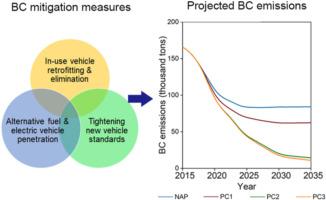Environmental Pollution ( IF 7.6 ) Pub Date : 2021-02-13 , DOI: 10.1016/j.envpol.2021.116746 Shaojun Zhang , Xiaomeng Wu , Xuan Zheng , Yifan Wen , Ye Wu

|
Black carbon (BC) is the most potent light-absorbing component of particulate matter and can have a significant warming impact. On-road vehicles are a major source of BC and a significant contributor to global warming. This paper establishes an updated inventory to quantify the mitigation potential of efforts to control BC emissions from on-road transportation in China. The total emissions of BC from on-road vehicles in China were 152.1 thousand tons in 2017. Heavy-duty diesel fleets accounted for a large percentage of emissions, whereas light-duty gasoline fleets presented a gradually increasing trend of emissions. Historically, comprehensive control policies for on-road vehicle emissions have achieved substantial BC reductions, with a 45% decrease in 2017 compared to 2000. With the implementation of stringent control policies and the development of advanced control technologies, BC emissions from the on-road sector may have a greater reduction potential in the future. By 2035, three various future scenarios representing different stringency levels of emission controls will reduce BC emissions by 58%, 90%, and 93% relative to 2017. The major benefits in reducing BC emissions result from more stringent emission standards and the accelerated retirement of older heavy-duty diesel vehicles. The shorter lifetime of BC than that of CO2 implies that the mitigation of BC emissions would offer an important opportunity to contribute to alleviating global warming in the short term. Our assessment reveals that in 2035, the most stringent scenario, Scenario PC3, could deliver a CO2-equivalent emission reduction on a 20-year scale of 234.2 (GWP20-yr) million tons compared with the NAP Scenario, which is equivalent to reducing the oil consumption in China’s transportation sector by nearly 20% from a climate impact perspective.











































 京公网安备 11010802027423号
京公网安备 11010802027423号